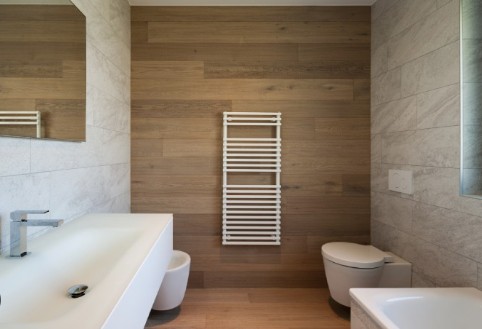Whether bathroom radiators need to be earthed might not be a topic that garners much attention, but considering every aspect regarding home safety and electrical installations is crucial. So, do bathroom radiators need to be earthed?
Bathroom radiators should be earthed to enhance safety against electric shock, reduce the risk of fire or injury, and enhance device longevity. Doing so also ensures you meet the electrical codes and regulations.
Discover why bathroom radiators should be earthed, the potential risks of neglecting this practice, and the steps to achieve proper earthing below.

Do Bathroom Radiators Need To Be Earthed? (Earthing Explained!)
Earthing or grounding refers to an electrical systems safety measure to prevent the risk of electric shock and to ensure the safe operation of appliances and devices. It involves connecting the metallic parts of an electrical device, appliance, or system to the ground or a reference point at a zero voltage potential, thus diverting dangerous electrical currents away from people and objects.
In the context of bathroom radiators, earthing ensures the safety of individuals using the bathroom. It protects the radiator and other connected electrical components from potential electrical faults.
Bathroom radiators often have electrical elements built into them for functions such as towel warming or space heating. These electrical elements require proper earthing to prevent any leakage of electric current to the radiator’s metallic surface.
Why Should Bathroom Radiators Be Earthed?
Here is why you must make sure your bathroom radiator is earthed.
1. Safety against Electric Shock
Water is a good conductor of electricity, and since bathrooms are high moisture areas, protection against electric shock is essential. If there’s a fault in the electrical system or a short circuit, an electric current could flow through the radiator’s surface, making it dangerous for anyone touching it.
However, proper earthing helps to direct any current leakage away from the radiator. Additionally, grounding helps maintain the electrical system’s neutral reference point. This is important for maintaining balanced electrical voltages and preventing potential voltage imbalances that could lead to dangerous conditions.
Grounding also provides fault currents with a low-resistance path to the ground. This path of least resistance ensures fault currents don’t seek unintended pathways, such as through a person’s body, which could result in serious injuries or fatalities.
2. Fault Protection
Electrical faults such as short circuits cause fault currents that can find unintended paths, potentially leading to dangerous situations if your bathroom radiator isn’t properly grounded. Grounding gives fault currents a controlled pathway into the ground, effectively diverting them away from sensitive components and minimizing the risk of electrical fires or damage.
Since proper grounding helps carry fault currents away from the affected area, it helps prevent the formation of arcing and sparks that could lead to fires or explosions.
3. Code and Regulatory Compliance
You should also earth your bathroom radiators to comply with electrical codes and regulations. Electrical codes often include specific requirements for different areas, such as bathrooms, due to the increased risk of moisture exposure.
Regulatory agencies require grounding bathroom radiators to mitigate the risks associated with electricity and water. This ensures you can safely use electrical devices in places prone to water exposure.
You risk facing legal and insurance implications by failing to comply with electrical regulations and codes. The consequences include voided insurance coverage or legal implications in case of accidents or injuries resulting from electrical hazards.
4. Enhanced Device Longevity
Grounding helps protect devices from transient voltage spikes and electrical surges from sources like power grid fluctuations and lightning strikes. It gives excess current a safe path to the ground, diverting it away from the device and preventing damage.
In addition, grounding helps stabilize electrical currents and voltages, reducing the potential for fluctuations that can contribute to premature device failure. Also, proper grounding helps protect the radiator’s metallic parts from galvanic corrosion by equalizing potentials between different metal parts.
Grounding your bathroom radiator will also safeguard it from overheating, voltage fluctuations, and catastrophic failures.
5. Peace of Mind
Knowing that your bathroom radiator is properly grounded reassures you that potential electrical hazards are minimized. This knowledge helps you feel safe while using the bathroom.
Also, it ensures your family and visitors’ safety. Furthermore, it alleviates concerns about potential financial losses from electrical faults that could lead to fires, damage to electrical devices, or even property damage.
In addition, you won’t have to live with the fear of the consequences of not complying with the electrical codes.

What Are The Different Ways Of Earthing A Bathroom Radiator?
You can earth your bathroom radiator in different ways. These are:
a) Direct Earthing to Ground
This approach involves connecting a dedicated earth wire directly from the radiator to a grounding point, such as a grounding terminal or bus bar.
The process involves attaching the earth wire to a designated metal part of the radiator and connecting the other end to the grounding point. This ensures electrical currents directly flow into the ground if a fault occurs.
b) Earthing via Conduit
The conduit can serve as the grounding path if the radiator is installed using a metal conduit. The conduit is typically connected to a grounding point or grounding wire, which extends the grounding connection to the radiator.
c) Bonding to Main Earth
Instead of directly earthing the radiator, you can bond it to the main earth connection of the building’s electrical system. This involves connecting the radiator to a common grounding point shared by other electrical devices and components in the building.
d) Earthing Through Plumbing
In some cases, radiators can be indirectly earthed through the plumbing system. This method relies on the fact that metal plumbing pipes are often connected to a building’s grounding system.
If the radiator is in contact with these pipes, it can acquire an earth connection through them.
e) Local Grounding Point
Some radiators have a designated grounding point built into their design. This point is intended explicitly for attaching an earth wire to ensure proper grounding.
How to Earth A Bathroom Radiator
Here are the general steps to follow to directly earth a bathroom radiator.
1) Gather Materials
You will need green and yellow-striped earth wire, appropriate connectors (such as crimp connectors), suitable tools (such as wire strippers and pliers), and required fasteners (like screws and lugs.)
2) Turn Off The Power
Before you begin any work, turn off the power to the circuit that supplies electricity to your bathroom radiator. Do this by switching off the relevant circuit breaker or taking out the fuse associated with the circuit.
3) Identify the Earth Connection
Find out where the earth connection needs to be made on the radiator. This typically involves attaching an earth wire to a metal part of the radiator.
4) Prepare the Earth Wire
Use a suitable gauge of green and yellow-striped earth wire specifically designed for grounding. The wire should be long enough to connect the radiator to the nearest earth connection point, such as a grounding terminal in the bathroom or a central grounding point in the building.
5) Attach the Earth Wire to the Radiator
Attach the earth wire’s one end to the metal part of the radiator designated for earthing. This is often a screw or lug specifically designed for this purpose.
Ensure the connection is secure and the wire tightly attached.
6) Route the Earth Wire
Carefully route the earth wire’s other end to the designated earth connection point. This might involve running the wire through the conduit or along the wall to keep it safe and hidden.
7) Attach the Earth Wire to the Earth Connection Point
At the designated earth connection point, usually a grounding terminal or bus bar, securely attach the other end of the earth wire. Make sure you get a well-secure and tight connection.
8) Test the Earth Connection
Once you’ve completed the earthing process, it’s a good idea to test the effectiveness of the grounding. A continuity tester or a multimeter helps ensure a proper electrical connection between the radiator and the earth connection point.
9) Restore Power and Monitor
After you’re confident that the earthing is done correctly, you can turn the power back on to the circuit. Regularly monitor the radiator and the earth connection to ensure the grounding remains intact and effective.
Note
Electrical work comes with certain risks, like being electrocuted, so before installing a bathroom radiator, ensure you have the necessary skills and experience. If not, hire a qualified electrician.
Do Bathroom Sinks Need To Be Earthed?
Bathroom sinks, like other electrical appliances or fixtures, do not need to be grounded. However, electrical outlets in bathrooms should be properly grounded and equipped with GFCIs to ensure safety when using the space.
Bathroom sinks are not a source of electrical risk. This is because they are usually made of materials that do not conduct electricity, such as porcelain, ceramic, or glass.
Do Showers Need To Be Earthed?
Showers must be grounded for safety reasons. Earthing helps prevent electric shocks and reduces electrical hazard risks in the shower.
Without proper grounding, you can get electrocuted if an electrical fault occurs in the shower or its components, such as the showerhead or water pipes. Also, many modern showers include electrical components, such as electric heating elements for water heating or built-in lights and fans, which must be properly grounded.

What Happens If Your Bathroom Radiator Is Not Earthed?
Failure to earth a bathroom radiator can lead to various risks, from personal safety hazards to property damage. For instance, touching a bathroom radiator without earthing can cause a severe electric shock, potentially resulting in injury or even death.
Additionally, electrical faults in non-earthed radiators can cause short circuits, sparking, or overheating. Also, appliances connected to the same circuit as your bathroom radiator could experience power surges during a fault.
Furthermore, non-compliance with electrical regulations due to improper earthing of bathroom radiators could result in costly corrective measures or legal consequences.
Final Take On Do Bathroom Radiators Need To Be Earthed?
Create a safe bathroom environment by ensuring your bathroom radiators are grounded. Remember neglecting this essential safety measure can lead to potentially life-threatening risks, property damage, and legal complications. Every detail matters with regard to safety.
Also, Read:
